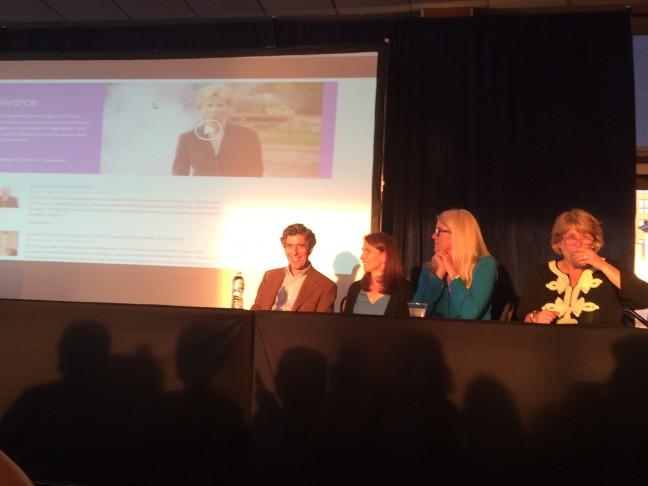Panelists gathered Thursday at University of Wisconsin’s Pyle Center to share one-by-one their own experiences with advancing women’s health and well-being.
The panel opened with a motivational video of Melanie Contreras, founder of Women to Women by Julia, a nonprofit organization that helps females during times of crisis and transition. The video, which featured how Contreras managed to embrace her health, identity and sexuality, set an empowering and upbeat tone for the evening.
Contreras said her work allows all women to move forward in life with assertiveness and knowingness, starting from herself. Contreras has been running since she was nine, and now, at the age of 60, she missed no more than 25 days of running in her life.
“My health is what allows me to do what I do every day. It is what allows me to engage in my life,” Contreras said. “Without my health, all other components [in my life] wouldn’t matter to me.”
She addressed the topic of female entrepreneurship, saying every woman has the ability to occupy a leadership role and need not establish power through raising her voice or acting like a man. Power is silent, Contreras said, something every woman owns within herself.
Maureen Pelson, UW alumna and social scientist, introduced her 30 years of work to address human conditions, especially gender norms. She uses an “integrative, systematic and holistic” approach to help promote sustainable solutions for women’s health and well-being, Pelson said.
James Gordon, a psychiatrist and The Center for Mind-Body Medicine founder, followed Pelson’s presentation with his own research about sexual abuse of females in a Native American Tribe, the Black Elk. He presented some startling statistics, such as 65 percent of all girls in that tribe were sexually abused, with a third of them being under 18. Among the victims, 20 teenagers killed themselves, 200 attempted suicide and another 250 have serious suicidal tendencies.
Gordon’s work aims to heal the depression of sexual abuse victims through mind-body medicine. He usually uses genograms and family trees to provide sources of ancestral strength to victims in the process of healing. But the first step is to establish a comfortable space to speak out, Gordon said.
“Many of the girls whom I met, who’ve been raped as children, never felt safe enough to talk about what happened to them to anyone,” Gordon said. “So [it’s crucial to] have a place where you can feel safe enough, with the confidentiality that you can talk and tell your story.”
An important part of women’s well-being is a healthy, positive mentality, as another panelist, Sona Dimidjian, explored in her short speech. The challenges on the way to mental well-being, Dimidjian said, are mainly a woman’s tendency to self-loath and overthink.
For example, studies show that while young women tend to engage in “fat talk,” asking others if they look fat in certain attires, the paradigm shifts through time and becomes “old talk,” where grown women ask others if they look old.
“A sensitive focus on appearance is something that persists in childhood and throughout their life cycle,” Dimidjian said.
Aly Teich, a UW alumna who founded a lifestyle brand and media platform called The Sweat Life, helps young women establish a healthy mentality about body images.
After 10 years of working in the media field, she increasingly realized the importance to use her media tools to build a powerful narrative that can influence more people to re-evaluate perception of women and healthy bodies, Teich said.
“What I knew was the key to changing people’s behavior was to build a narrative,” Teich said. “In a landscape where health and wellness is coming to the forefront, [the fact that] there’s more choices than ever is just amazing.”


















